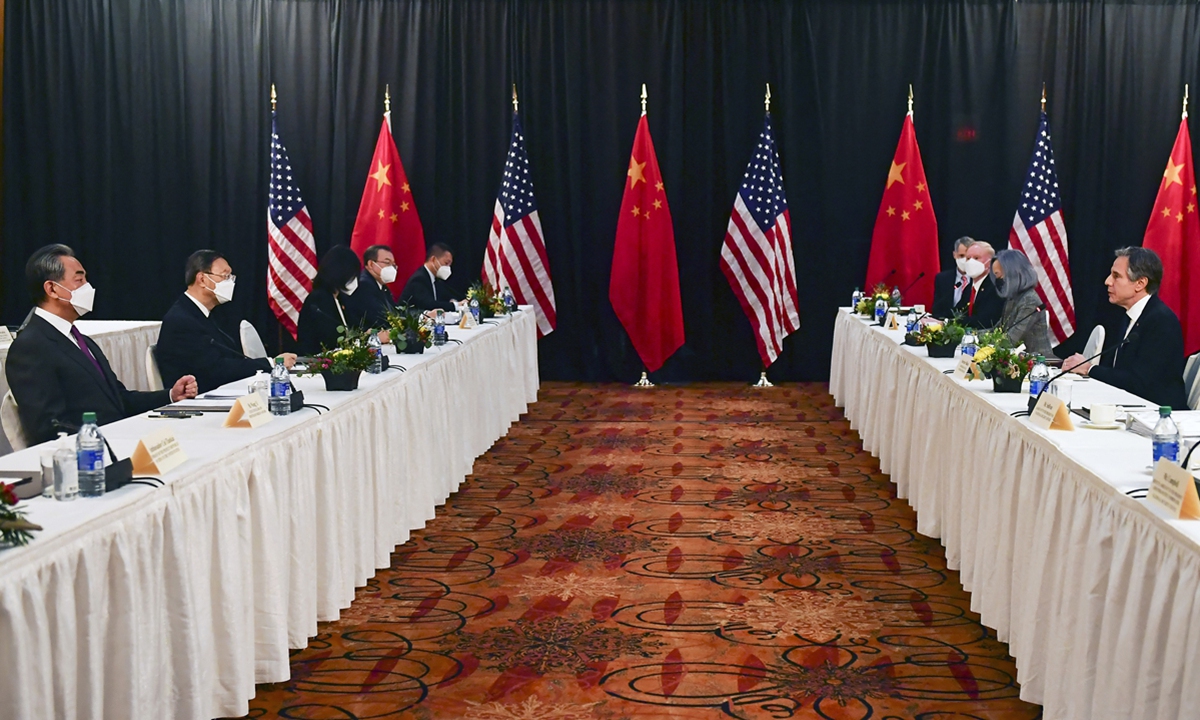What did China and US learn about each other from Alaska talks?: Global Times editorial

Photo: AFP
After a fierce, tit-for-tat opening, the close-door strategic dialogue afterward between China and the US in Alaska went smoothly and the result was far better than people's expectations. Both sides completed three rounds of talks. Both admitted in their press conferences that the talks were "candid" and each sought to work with the other side in some fields.
The very role of a strategic dialogue is to boost mutual understanding and avoid strategic miscalculation. To this end, the latest one between China and the US made some progress.
The Alaska meeting was initiated by the US. It had made great efforts in it, in fear that the Chinese side would underestimate the US' tough stance toward China. From the US' previous words and deeds and its performance during the talks, the Chinese side has further understood Washington's determination to use every possible way to maintain its hegemony and realized the Biden administration's continuity of the Trump administration regarding its China policy.
The US views its alliance system as a prominent bargaining chip to pressure China. It has shown no intention to eradicate the Trump administration's extreme China policy in a short period of time. But it said it does not want to push bilateral relations to the point of confrontation. But apparently, the US would go into confrontation when necessary.
It is believed the US will understand China more through this dialogue. The US should be clear that China is not afraid of being blackmailed and is determined to safeguard its sovereignty and core interests. In particular, China does not want the US to interfere in China's internal politics and there is no bargaining on this. Any relevant moves from Washington will meet serious resistance and countermeasures. The US should get to know China's political confidence and its resolve and ability to develop and thrive steadily in accordance with its long-term plans. It also knows that China despises the pressure imposed by the US and its allies. China doesn't care about its geopolitical tools. The US must have had a sense of futility about containing China.
Obviously, there are deep differences between both sides. The intensity of the opening is record-breaking since the two established diplomatic ties. But the delegations of the two countries and the two societies are rapidly adapting to this rivalry. This dialogue revealed conflicts between the two countries and both sides showed their stance. Adaptability and acceptance of the current situation can be seen as a way to stabilize the situation. If both have strategic rationality, negativity may turn into constructive factors. This can be seen as the second significance.
The misunderstanding between China and the US for a long time is that the US believes it can contain and suppress China with its strength and Cold War experiences. China, on the other hand, is confident to dilute US strategic containment because of its established comprehensive capability and development potential as well as its confidence regarding its political system. This misunderstanding cannot be solved via dialogue and can only be addressed via future competition.
In recent years, China's self-confidence is more powerful than the US'. The US has made up false justice in wooing its allies and containing China with the tool of so-called human rights. In terms of the essence of the China-US conflict, it is the US' malicious strategic objectives of maintaining its hegemony and suppressing the fast development of China as the world's most populous country. On the contrary, China is trying to maintain its right to develop and the right of the Chinese people to live a better life. As China-US struggles drag on, the Chinese people's unity and the global moral call will expose the US' weaknesses.
It is a fantasy to strike China down. Putting China in awe is day-dreaming. Both sides have to accept the status quo that neither will compromise, and work for cooperation areas in an unfriendly atmosphere and find a way out. Strategic patience and restraint are required for 21st century major powers. There needs to be a framework that is able to tolerate and dilute conflicts. We hope China and the US can work toward that goal.
